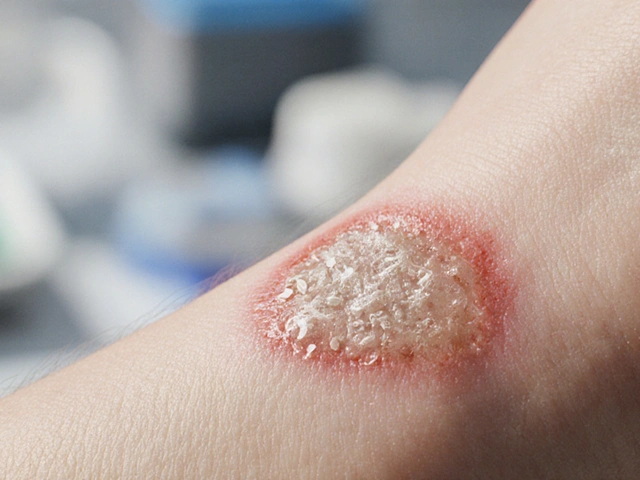Introduction to Norethindrone Acetate
As a blogger who loves to keep up with the latest trends and discoveries in health and wellness, I recently came across a topic that piqued my interest - Norethindrone Acetate and its possible connection to hair loss. In this article, we will dive deep into this subject, exploring the various aspects related to Norethindrone Acetate and hair loss. So, let's get started!
Understanding Norethindrone Acetate and Its Uses
Norethindrone Acetate is a synthetic progestin hormone, primarily used in hormonal contraceptives and hormone replacement therapy. It is commonly found in birth control pills and is used to regulate menstrual cycles, prevent pregnancy, and treat symptoms of menopause such as hot flashes and vaginal dryness. In addition, it may be prescribed to women with endometriosis or abnormal uterine bleeding to alleviate their symptoms. Despite its many benefits, Norethindrone Acetate has been associated with a range of side effects, including hair loss.
Hair Loss: A Possible Side Effect?
While Norethindrone Acetate is generally considered safe and effective for its intended purposes, some users have reported hair loss as a side effect. This is thought to be due to the hormonal changes that occur in the body when taking this medication. Specifically, it is believed that the progestin hormone can cause hair follicles to shrink, leading to hair thinning and, ultimately, hair loss. However, it is important to note that this side effect is not experienced by everyone, and the severity can vary from person to person.
Who is at Risk?
It is difficult to predict who will experience hair loss as a side effect of Norethindrone Acetate. Some factors that may increase the risk include genetic predisposition to hair loss, a history of hormonal imbalances, or exposure to other medications that can cause hair loss. Additionally, women who have previously experienced hair loss during pregnancy or while using other hormonal contraceptives may be more susceptible to this side effect.
Preventing and Managing Hair Loss
If you are concerned about hair loss while taking Norethindrone Acetate, there are several steps you can take to help prevent and manage this side effect. First and foremost, it is crucial to communicate with your healthcare provider about your concerns. They can help determine if Norethindrone Acetate is the best option for your needs and may recommend alternative treatments if necessary.
Additionally, maintaining a healthy lifestyle can help promote hair growth and minimize hair loss. This includes eating a balanced diet, exercising regularly, managing stress, and practicing good hair care habits such as gentle washing and minimal use of heat-styling tools. In some cases, over-the-counter treatments like minoxidil may be recommended to help stimulate hair growth.
When to Seek Medical Attention
If you experience significant hair loss while taking Norethindrone Acetate, it is essential to seek medical attention promptly. Though hair loss may be a rare side effect, it could also be indicative of an underlying health issue that requires further evaluation and treatment. Your healthcare provider can help determine the cause of your hair loss and recommend the appropriate course of action.
Other Potential Side Effects of Norethindrone Acetate
While this article focuses on the possible connection between Norethindrone Acetate and hair loss, it is essential to be aware of other potential side effects associated with this medication. Some common side effects include irregular menstrual periods, breast tenderness, headache, dizziness, and mood changes. More severe side effects can include blood clots, stroke, and liver problems, although these are rare. If you experience any concerning side effects while taking Norethindrone Acetate, it is crucial to contact your healthcare provider immediately.
Conclusion
In conclusion, while there is evidence to suggest a possible link between Norethindrone Acetate and hair loss, it is essential to remember that everyone's experience with this medication may differ. If you are concerned about the potential for hair loss, it is crucial to discuss your concerns with your healthcare provider, who can help determine the best course of action for your individual needs. By staying informed and proactive about your health, you can make the best decisions for your wellbeing.








May 6, 2023 AT 22:43
Vivek Mishra
Norethindrone doesn't cause hair loss. It's all in your head. Or maybe your genes.
May 7, 2023 AT 17:09
thilagavathi raj
This is a classic iatrogenic androgenic alopecia cascade triggered by exogenous progestogenic modulation of the follicular androgen receptor sensitivity. You're not losing hair-you're undergoing a hormonal recalibration. #EndocrinologyAlert
May 9, 2023 AT 14:57
Sandridge Neal
Thank you for writing this with such clarity and care. It's so important to approach hormonal side effects with both scientific rigor and compassion. If you're experiencing hair thinning, please don't panic-consult your provider, track your symptoms, and know that many women navigate this successfully with the right support.
May 9, 2023 AT 17:56
Diane Thompson
Ugh. Another post about hair loss from birth control. I've been on this for 5 years and my hair is fine. Stop hyping up side effects that don't even happen to most people.
May 10, 2023 AT 18:35
Helen Moravszky
i just wanted to say that if you're worried about this, you're not alone!! i started losing hair after switching pills too, and it was scary. but i talked to my dr and we switched to a lower-androgen progestin and it got better. you got this. 💪❤️
May 10, 2023 AT 23:06
Reginald Matthews
I wonder if there's data on whether hair loss correlates more with the estrogen component or the progestin in combination pills. Most studies focus on the pill as a whole, not individual components.
May 11, 2023 AT 07:05
Debra Callaghan
People need to stop blaming hormones for everything. If you're losing hair, it's probably because you're stressed, eating garbage, or not sleeping. Stop looking for a magic pill to fix your life.
May 12, 2023 AT 17:23
Mitch Baumann
Ah, yes. The classic 'hormone-induced telogen effluvium'... 🧬🪮 I mean, have you even read the 2021 Cochrane meta-analysis on progestin-associated alopecia? Or are you just scrolling through TikTok like the rest of them? 🤦♂️
May 13, 2023 AT 23:26
Samuel Wood
I've been on norethindrone for 3 years and my hair is thicker than ever. Maybe its not the drug maybe its your shampoo? or your water? or your genes? just saying
May 14, 2023 AT 04:58
ridar aeen
I've seen this so many times. Women panic, go off their meds, and then get worse. You can't just quit hormones like they're coffee. Talk to a professional first.
May 15, 2023 AT 10:33
chantall meyer
In my clinic in Cape Town, I see this every month. The real issue isn't the drug-it's the lack of proper pre-treatment counseling. Women are prescribed this like it's aspirin. No labs. No history. No follow-up. Sad.
May 15, 2023 AT 20:06
Shana Labed
I was terrified when I started shedding-like, clumps in the shower, panic mode. But my OB-GYN said it was temporary and we switched to drospirenone. My hair is back, I'm thriving, and I'm not looking back. You're not broken-you're just on the wrong formula. 💇♀️✨
May 16, 2023 AT 15:05
Vishwajeet Gade
This is why Western medicine is broken. In India, we use Ayurveda. No chemicals. No side effects. Just herbs and balance. You people are addicted to pills.
May 17, 2023 AT 08:20
Shanna Talley
There's something beautiful about how our bodies respond to change-even when it's uncomfortable. Hair loss can be a signal, not a sentence. Listen to your body, but don't fear it. You're more than your strands.
May 18, 2023 AT 06:26
Gina Damiano
I just want to say I’ve been on this for 4 years and I’ve lost 30% of my hair. I didn’t think it was related until I saw your post. Thank you. I’m not crazy.
May 18, 2023 AT 16:27
Emily Duke
Oh great, another woman crying about her hair. Meanwhile, men are balding at 25 and no one cares. You're lucky you even have hair to lose.
May 20, 2023 AT 01:24
Stacey Whitaker
In my culture, we don’t talk about hair loss like it’s a crisis. It’s natural. You age. You change. Your body adapts. Maybe the problem isn’t the pill-it’s how much we’ve made hair into identity.
May 20, 2023 AT 03:15
Kayleigh Walton
Thank you for sharing this thoughtful overview. If anyone is considering a switch, I highly recommend discussing spironolactone as an adjunct-it’s been life-changing for many of my patients with hormonal hair thinning. Always under medical supervision, of course.
May 21, 2023 AT 17:46
Stephen Tolero
What is the prevalence rate of telogen effluvium specifically associated with norethindrone acetate versus other progestins? Please cite primary literature.